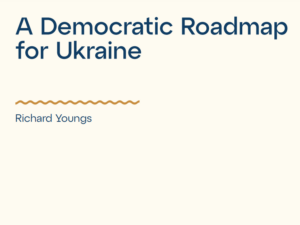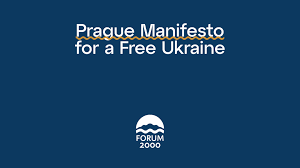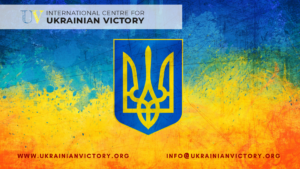 We cannot allow Ukraine to fail financially through no fault of its own, says Anders Åslund, a senior fellow at the Stockholm Free World Forum, and the author of Russia’s Crony Capitalism: The Path from Market Economy to Kleptocracy. The best solution, as I have previously argued, is to confiscate the roughly $400 billion of frozen Russian reserves held across seven Western countries, and send them to Ukraine as reparations, he writes for Project Syndicate:
We cannot allow Ukraine to fail financially through no fault of its own, says Anders Åslund, a senior fellow at the Stockholm Free World Forum, and the author of Russia’s Crony Capitalism: The Path from Market Economy to Kleptocracy. The best solution, as I have previously argued, is to confiscate the roughly $400 billion of frozen Russian reserves held across seven Western countries, and send them to Ukraine as reparations, he writes for Project Syndicate:
Canada has already adopted a law allowing for this, though it has not yet seized any Russian funds. The EU offered substantial grants to support its members’ economies during the COVID-19 pandemic, and there is no good reason why it cannot muster the much smaller sums needed to assist Ukraine.
It no longer seems preposterous to suggest that Russia can lose this war, notes strategist Lawrence Freedman.
If hardliners take power having objected not so much to the war but the way it has been prosecuted they will face the same corrosive issues – of shortages of men and equipment, messed up logistics and stretched command networks, he writes. As seriously they will face a country unsettled and anxious, possible on the edge of the sort of chaos that has engulfed Russian society in the past at the end of failed wars.
 The appointment of one such hardliner, General Sergei Surovikin, “fits into the traditional mythology: you have useless commanders who lead the Russian army to defeat and you need some fierce warrior who can turn the war around, sort out supplies and use a strong hand to restore order”, said Ilya Venyavkin, the historian.
The appointment of one such hardliner, General Sergei Surovikin, “fits into the traditional mythology: you have useless commanders who lead the Russian army to defeat and you need some fierce warrior who can turn the war around, sort out supplies and use a strong hand to restore order”, said Ilya Venyavkin, the historian.
Putin appears to have decided that “the Soviet Union collapsed because they didn’t have people ready to use extreme force”, he told the Financial Times. “So now if we have a geopolitical threat defined only by Putin and the people in power, they are ready to use any force they deem appropriate to defend against it.”
Ukraine might be an example of how keeping civil society active, maintaining the overall growth capacity of CSOs, can help sustain democracy, says a leading expert.
For several years, in the mid-2010s, the quality of Ukraine’s democracy was getting worse, life was getting more difficult for civil society and it was being attacked in severe ways, notes Richard Youngs, a senior fellow at Carnegie Europe. But we see a very strong civil society with a lot of resilience. Now, all the support provided to Ukraine’s civil society is being shown to have had both relevance and impact, he adds.
 As a concrete policy deliverable, the international community should create a dedicated initiative and funding for ‘Ukrainian social resilience for war’. Ukrainian civil society already has a record in contributing to self-defence functions: this needs further support and encouragement. A whole-of-society approach should provide a bridge between war fighting and governance aspects of a long-term roadmap for Ukraine, he writes in A Democratic Roadmap for Ukraine, a paper for Forum 2000:
As a concrete policy deliverable, the international community should create a dedicated initiative and funding for ‘Ukrainian social resilience for war’. Ukrainian civil society already has a record in contributing to self-defence functions: this needs further support and encouragement. A whole-of-society approach should provide a bridge between war fighting and governance aspects of a long-term roadmap for Ukraine, he writes in A Democratic Roadmap for Ukraine, a paper for Forum 2000:
[F]unders could set up a ringfenced ‘Political reconstruction’ basket to coalesce support for this objective and involve civil society scrutiny over this. Ukrainian civil society organizations have reiterated that the tragedy of the war must be used to usher in more open, localized and rights-oriented economic and political models. ……While Ukrainian civil society organizations have adjusted to work with the government during the invasion, they stress the importance of international powers helping spur a deeper democratization as the conflict unfolds.
 Some experts have said that perhaps the most important motivating factor for Putin was his fear that Ukraine would continue to develop into a modern, Western-style democracy that would inevitably undermine his autocratic regime in Russia and dash his hopes of rebuilding a Russia-led sphere of influence in Eastern Europe, notes the Council on Foreign Relations.
Some experts have said that perhaps the most important motivating factor for Putin was his fear that Ukraine would continue to develop into a modern, Western-style democracy that would inevitably undermine his autocratic regime in Russia and dash his hopes of rebuilding a Russia-led sphere of influence in Eastern Europe, notes the Council on Foreign Relations.
“[Putin] wants to destabilize Ukraine, frighten Ukraine,” writes historian Anne Applebaum in the Atlantic. “He wants Ukrainian democracy to fail. He wants the Ukrainian economy to collapse. He wants foreign investors to flee. He wants his neighbors—in Belarus, Kazakhstan, even Poland and Hungary—to doubt whether democracy will ever be viable, in the longer term, in their countries too.”
The Atlantic Council’s Melinda Haring suggests seven things you can do to aid Ukraine, including the October 18 Benefit Concert for Ukraine, organized by the Chopivsky Family Foundation, at the Kennedy Center in Washington, D.C., with Grammy-award winning violinist Joshua Bell and the New Era Orchestra of Kyiv.







